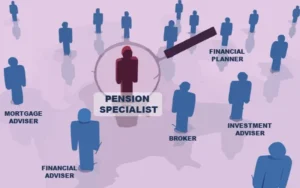As you near retirement, you should talk to a pension advisor to help you find the right financial product to meet your needs. A pension should provide you with enough money to live comfortably when you’re no longer working, but if you have grander retirement plans, you might need a different financial product. You should also identify the amount you are willing to pay for a pension and determine your expectations. An experienced advisor will be able to help you set realistic expectations and work toward them.

What qualifications do I need to be a pension advisor?
To become a pension adviser, you need to have a bachelor’s degree or higher. Many employers will also look for previous experience in customer service and complex financial investments. In addition, you should have good interpersonal and communication skills. You should also have a working knowledge of economics, accounting, and mathematics. As a pension adviser, you will also need to have excellent organizational skills, be computer literate, and be able to read financial policies.
In the UK, you must be regulated by the Financial Conduct Authority.
In addition, you must have a level 4 diploma to recommend retirement products. However, many advisers have higher qualifications, such as the Chartered Financial Planner (CFP) certification. Having this certification shows that you have a strong knowledge of financial matters, and it also shows that you’ve dedicated yourself to this field. Furthermore, many advisers hold professional memberships with professional bodies.
If you’d like to sell stocks, you’ll need to take the FINRA Series 7 exam. This exam is also known as the General Securities Representative (GS) exam and focuses on the securities industry. You must score 73 out of 100 to pass. You can take the exam multiple times. If you fail once, you can try again after 30 days, but if you fail three times, you’ll have to wait 180 days.
Are pension advisors free?
There are some organizations that offer free pension advice. These organizations include Age UK, Money Helper, and Pension Wise. You can also get financial advice from independent financial advisers. There is no charge for general information on pension schemes, though you may need to pay for specific advice. If you are over 50, you can also use the Pension Service’s free financial advice sessions.
The costs of pension advice vary, but the average amount is around PS30,000, according to a report by the Royal London Institute of Financial Advisors (unbiased). The gains from professional advice should outweigh the costs. However, if you only have a smaller pension pot, a professional adviser may not be worth the extra money. Pension Wise provides free pension guidance by appointment, lasting up to an hour. These appointments are tailored to you and can be done in person or over the telephone.
The Pension Wise experts can help you understand your situation and options before you retire. They can also help you plan how you want to use your pension and how you will leave your money to your family. They will also explain tax implications and other options and can help you avoid scams.
Which pension advisor is suitable?
There are a number of different types of advisers, and it’s important to find one that suits your individual needs. Some advisers specialize in one or two areas and will only work with a limited number of companies. Other advisers are independent and can look at a range of products. A qualified adviser has a Statement of Professional Standing, which means that they have signed a code of ethics and have taken 35 hours of professional training every year. Their certificate has to be renewed annually.
Government pension advice
The role of a Government pension advisor is to provide free, impartial advice on pensions. Most pensions are bought into an annuity scheme, which guarantees a fixed annual income for life. Once bought, these annuities cannot be changed. However, a new FCA study has found that pension savers are missing out on as much as PS10,000 in retirement – if they’re not allowed to shop around.
The new pension reforms came into effect on 6 April 2015, including the freedom to choose what to do with your pension pot. The government provides a free service, called Pension Wise, which can help you understand your options and make informed decisions about your future. The guidance specialists don’t offer investment advice or sell products – just give you the facts you need to make an informed decision.
What questions should you ask a pension advisor?
When looking for a pension advisor, make sure you ask the right questions. It’s important to understand the different benefits and tax implications of your pension. You should be aware of your expectations as a retiree and make sure your pension will be enough to meet those expectations. You should also be aware of the different types of retirement plans. Not all of them have the same level of flexibility and you should be aware of these details before deciding on which pension to choose.
If you have a large retirement plan, you should ask for regular updates on your investment strategy. Ask for the latest reports and ask for clarifications if necessary. A pension advisor should be able to answer your questions and be confident in his or her ability to help you reach your goals.

The compensation of your pension advisor should also be transparent.
You should find out whether the retirement adviser is compensated by fees or by commissions from products sold to you. You should also know the way he or she will communicate with you. Some advisors prefer to meet face-to-face, while others prefer to work over the phone or email. If your advisor does not have a face-to-face presence, you can ask him or her to make phone calls whenever you have a question or concern.
Pension advise for over-50s
In the past two years, Citizens Advice has seen an increase in the number of people over 50 seeking financial advice. They have begun offering financial advice in some of their local bureaus. Many people are also concerned about pension mis-spelling, which makes it easier for scammers to target people’s entire pension savings.
Before choosing a pension plan, people should assess their financial situation as a whole. This includes considering their savings and income in retirement. An experienced financial advisor can help them figure out the best course of action for their particular needs. They can also help people plan their overall financial plan. They will also discuss their current financial situation and any other important factors that they think will affect their future.
Investing during the working years is a common goal for most investors.
However, those over 50 should focus more on protecting their principal, because bad bear markets can derail their retirement plans. They may have to delay retirement or risk running out of money too early, and recovering from the losses may take years.
Are pension advisors worth it?
There are some benefits of pension advisors. For example, they can help you choose the right drawdown scheme and can set it up for you. Your adviser can also help you choose the best investment opportunities and protect your investments. They also have a thorough understanding of pension rules and legislation, which makes them an invaluable resource.
